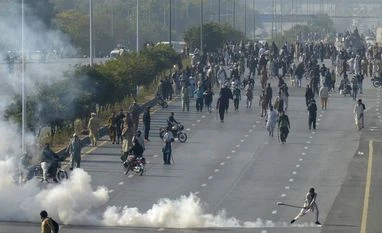By Ismail Dilawar
Pakistan’s opposition party of former prime minister Imran Khan ended its protest in the capital Islamabad on Wednesday as the government arrested hundreds of its supporters in an overnight crackdown after two days of deadly demonstrations.
The “law enforcement force cleared the main avenue” in Islamabad, according to a statement by the interior ministry early morning. Top leaders of Khan’s party including his wife Bushra Bibi and Ali Amin Gandapur who were leading the protest, escaped from the area, Interior Minister Mohsin Naqvi told reporters after the crackdown.
Pakistan Tehreek-e-Insaf has called off the protest after the government’s “brutal action,” Atif Khan, a lawmaker of Khan’s party, said in a text message.
More From This Section
The protest that began on Sunday killed at least six people including four security officials and roiled the country’s financial markets on Tuesday. Thousands of supporters of the jailed leader breached roadblocks and clashed with the police for the past two days to converge in Islamabad, defying efforts by Prime Minister Shehbaz Sharif’s government to stop them from entering the city.
The benchmark KSE-100 index jumped as much 3.6% on Wednesday, the most in more than five months, recovering almost all of its losses from a day earlier.
The protesters gathered near the so called Red Zone on Tuesday and the party announced to stage a sit-in till the government accepted their demand of releasing Khan from jail. The former cricket star is facing more than 150 cases from corruption to misuse of power when he was the premier for about four years until 2022.
The search operation is ongoing and a large number of protesters who started a sit-in in Islamabad to demand Khan’s release from jail have been arrested, information minister Attaullah Tarar told ARY News earlier. The main protest area has been cleared and all the barricades will be removed on Wednesday, Tarar said.
The protest is seen as the biggest political challenge since Sharif’s coalition government took power after national elections in February. The premier has said such protests are a distraction to his government, which is trying to reform the country’s weak economy by taking difficult decisions under the International Monetary Fund’s new loan program. Those include taxing agriculture and retail sectors that have resisted attempts in the past.
)